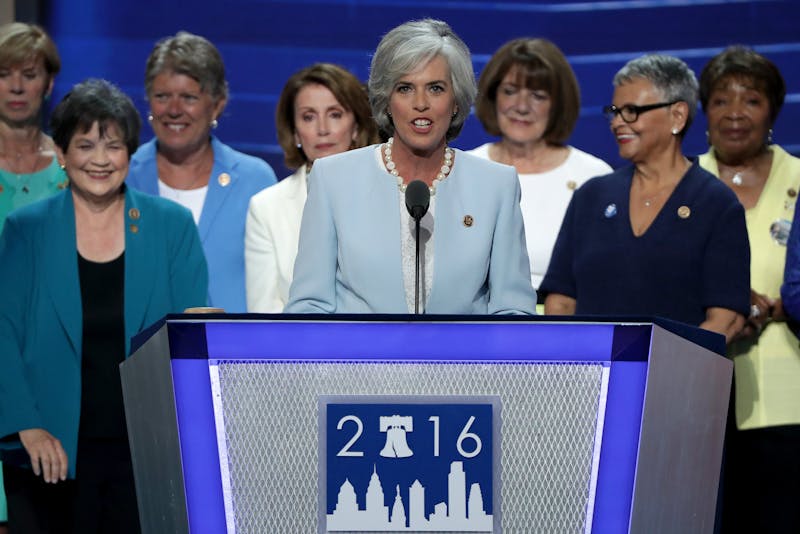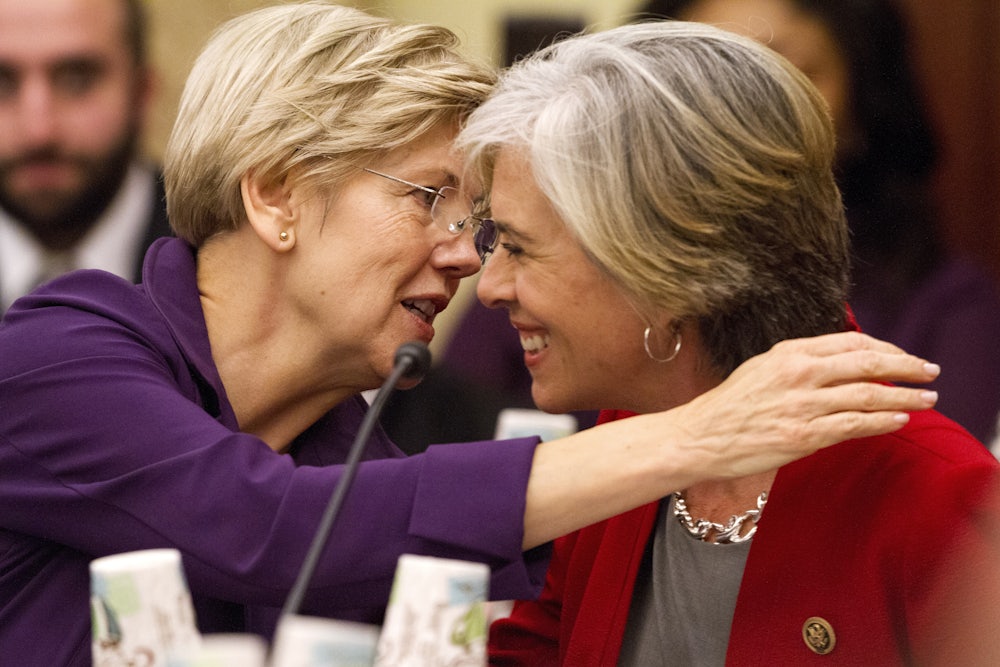Katherine Clark was tired of the moments of silence. After each mass shooting, legislators would file solemnly onto the floor of the U.S. House of Representatives, proclaim their immense sadness and frustration over the latest tragedy, and bow their heads—then do nothing. That “grisly routine,” as the congresswoman calls it, repeated yet again after the massacre at the Pulse nightclub in Orlando in June, the deadliest in American history. Republicans refused to allow a vote on legislation with overwhelming public support: a bill to close a loophole on background checks, and another forbidding people on the FBI’s terrorism watch list from buying guns.
“That’s all we have are these moments of silence,” Clark, a Democrat who represents Massachusetts’s 5th congressional district, told the New Republic. “The absolute refusal to bring forth two commonsense bills that are pro–Second Amendment and can help stem the incredible wave of gun violence we’re seeing in this country; they’re bipartisan, and commonsense, and we couldn’t even get them up for a vote.”
Clark took her frustration to Representative John Lewis, the civil rights icon from Georgia. He suggested they “try something dramatic,” and together they led a sit-in on the House floor. Republicans ignored the action and shut off C-SPAN’s live feed, which the Democrats worked around by broadcasting live to social media. The sit-in lasted more than 24 hours, drawing 170 legislators in the House chamber and a large crowd of supporters outside the Capitol Building.
“This was something that had really captured the attention not only of the American people, but across the globe,” said Clark, calling it “an incredible moment of pride” for the Democrats. “It was an extraordinary moment.”
It was—albeit an unsuccessful one, if the goal was to force a vote on the two gun bills. But compared to the usual milquetoast behavior of Congress, the spectacle was almost revolutionary. And it wasn’t the first time Clark had taken such a bold stand. A former prosecutor, she made national news during the Gamergate controversy in 2015, when she launched a crusade against internet trolls—calling on the FBI and Department of Justice to investigate and prosecute online harassment, and sponsoring several bills to address the problem. More recently, she was just the second of more than 60 members to announce she would boycott Donald Trump’s inauguration. Instead, she spent the day meeting with the Planned Parenthood League of Massachusetts. The next day she was back in the capitol for the Women’s March on Washington.
Democrats, now fully in the minority in Washington, will need this kind of political punch in opposing the Trump administration, but they will also need legislative savvy. Clark is not a bomb-throwing ideologue who’s more interested in getting media attention than in getting things done on the Hill. In the 114th Congress, she was the lead sponsor of eight bills that were signed into law. More recently, she’s sponsored legislation in the House—The Presidential Conflicts of Interest Act—that would attempt to rein in the Trump administration’s myriad violations of the Emoluments Clause; the bill has around 80 co-sponsors for so far.
At a time when the Democratic Party is bitterly divided between the emboldened progressives and reeling centrists, Clark has carved out a space that fluctuates between the party’s poles. She’s willing to be a progressive pugilist when necessary, but has also demonstrated the savvy to reach across the aisle in the service of her ideals. That political flexibility—or cunning, depending on your perspective—may prove invaluable to the Democratic opposition to Trump, which suggests Clark’s star may rise further yet.
Katherine Clark was born in 1963 in New Haven, Connecticut. Her mother was a librarian, her father an attorney. After getting her law degree from Cornell, she joined a large firm in Chicago. She later clerked for a federal judge in Colorado, followed by stints with the state’s attorney general and the Colorado District Attorneys’ Council. In 1995, Clark moved to Massachusetts, where she studied at the Kennedy School of Government at Harvard and worked as general counsel for the state Office of Child Care Services. That latter role has shaped much of her family-based approach when it comes to legislation.
“I became a prosecutor and did a lot of crimes against children, and that’s really where I became interested in the intersection of how families fall into our criminal system,” she said. “That brought me to issues around housing, educational opportunities, how we deal with income inequality and job opportunities. All those policies, I hoped, if I could work on those, it could prevent these children from moving into the criminal justice system.”
Though Clark volunteered on Bill Clinton’s campaign in 1992, it wasn’t until 2001 that she entered politics herself, running for the Melrose School Committee. She was among eight candidates for nine open spots—hardly a brave gamble, she jokes. Once she tasted public service, she was hooked. In 2002, she ran unsuccessfully for the Massachusetts Senate before eventually winning a seat in the state House in 2007. Even then, she never imagined serving in the U.S. House of Representatives.
“People often ask me if being in Congress is a lifelong dream. But as early as a few weeks before I announced for Congress I still thought it was not a place where I wanted to put my energy,” she said. “In some ways this is an unlikely journey for me.”
Clark has Barack Obama to thank for it—indirectly. After the president tapped John Kerry for secretary of state, Representative Ed Markey won a special election for Kerry’s vacated seat. A second special election was then held for Markey’s congressional seat. Clark dispatched six Democratic rivals before trouncing the Republican choice with 66 percent of the vote.
In her short time on the Hill, Clark has won the admiration of her colleagues and constituents. She’s a compelling speaker, as comfortable delivering an emotional plea or self-deprecating wisecrack as she is explaining wonky legislation. Her successful bills include federal funding for the study of and treatment of postpartum depression, and measures to address the opioid epidemic that has hit much of the country, including her own district. The latter law, she says, is an example of how the two parties can find common ground: Mitch McConnell is the lead sponsor. “This epidemic doesn’t care if you’re a red state or blue state, what level of income you have, how much education, it is an equal opportunity killer,” she said. Clark also penned a domestic violence bill with Republican Representative Ileana Ros-Lehtinen, with whom she played on the women’s congressional softball team.

“I observed the same phenomena when she was in the legislature,” said Massachusetts Representative Alice Peisch, who served with Clark in the state legislature. Peisch credits Clark with pushing through one of the most significant pieces of legislation she worked on, a 2010 achievement gap bill that then-Governor Deval Patrick called the “the biggest step forward we’ve made in nearly two decades in public schools.”
Clark earned a coveted spot on the U.S. House Committee on Appropriations this year, and has even had her name floated as a potential challenger next year to Massachusetts’ popular Republican governor, Charlie Baker. Steven Ultrino, another state representative who worked with Clark, isn’t surprised to see her national profile growing. “She’s not one of those average politicians when she sees a camera she runs to it,” he said. “A lot of what she does is behind the scenes.”
Despite her time in Washington, Clark is still a regular presence in the community, he said. For instance, a constituent in Malden recently got very sick, and wasn’t able to leave her home. “Katherine says, ‘I’ll come over next week and I’ll do your hair for you,’” Ultrino said. “You don’t see a city councilman do that never mind a congresswoman. I know it sounds touchy-feely but I think that’s what’s missing, from municipal up to Washington—the humanistic approach.”
One Sunday night last January, while Clark and her husband watched TV at their home in Melrose, she noticed a large police presence forming outside. She went to the door to check it out and saw a swarm of officers on her lawn with their rifles drawn. Clark, whose two teenage sons were home at the time, asked what was going on—though she had a good idea. She’d be “swatted.”
Melrose police later confirmed they’d received a computer-generated voice messages about “shots fired and an active shooter” at her address. Under normal circumstances, it would have been a terrifying thing to hear, but Clark, having recently introduced the Interstate Swatting Hoax Act, quickly pieced things together.
“Your mind races through lots of scenarios,” she told me back in April. “I can only imagine if you were not familiar with swatting, and if the police hadn’t known they were responding to my house. It certainly has given me a new perspective on just how serious and dangerous this is.”
Clark had introduced the anti-swatting bill after it happened to one of her constituents: video game developer Brianna Wu, who was targeted for harassment amid the Gamergate controversy in 2014. Wu had spoken out about sexism in the gaming industry, and eventually was forced to flee her home. Now Clark was the target of a similar harassment campaign.
“Rather than backing down, [Clark] doubled down on changing this culture,” Wu, who recently announced she’s running for Congress, said earlier this year. “I think when we’re dealing with so much distrust of the political system, it seems broken, hopeless, and corrupt in some ways. But when you have someone like Clark who is putting it all on the line for the women in her district like me, it’s amazing. You don’t see that today.”
This is where Clark seems to have found her niche: standing up to bullies, whether they’re internet trolls, the gun lobby, or President Trump. It’s something that Democrats will need more of in opposing the administration and a Republican Congress.
“I think we’re at an extraordinary crossroads as a democracy, and that this extraordinary time calls for me to not just be standing there in support of the new president, but to instead say there are great dangers indicated here and we have to pay attention to them,” Clark said. “I think we’re going to have a lot of examples in this incoming administration where we need to come together to make sure the American people know they do have voices, they do have representatives that are working hard, and are going to be disruptive if that’s their only avenue.”
